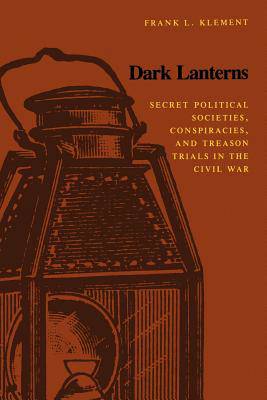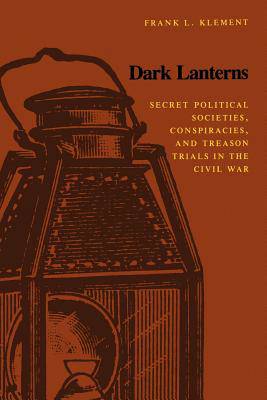
- Retrait gratuit dans votre magasin Club
- 7.000.000 titres dans notre catalogue
- Payer en toute sécurité
- Toujours un magasin près de chez vous
- Retrait gratuit dans votre magasin Club
- 7.000.000 titres dans notre catalogue
- Payer en toute sécurité
- Toujours un magasin près de chez vous
Dark Lanterns
Secret Political Societies, Conspiracies, and Treason Trials in the Civil War
Frank L KlementDescription
During the agonizing days of the Civil War four secret political societies, often known as dark lantern societies, became household words throughout the North. Three of these groups--the Knights of the Golden Circle, the Order of American Knights, and the Sons of Liberty--supposedly were umbrellas for antiwar Democrats and were reportedly involved in treasonable activities. The Union League, on the other hand, was a patriotic political organization intent upon buttressing northern morale and giving support to the war program of the Lincoln administration. The accusations and counter accusations that passed between these opposing forces helped spread fantastic rumors about their power and influence. Treason trials held in Cincinnati and Indianapolis based convictions on hearsay, while the leaders of the Order of American Knights and the Knights of the Golden Circle spent much of the war in prison without benefit of trial. Today reputable reference sources still matter-of-factly credit these societies with large memberships and evil motives.In Dark Lanterns Frank L Klemment refutes past historical theories and shows quite clearly that these societies were never much more then paper-based organizations with vague goals and little ability to carry them out. Recounting the actual histories of these organizations, he shows how they were senationalized, even fictionalized, in both Republican and Democratic newspaper and magazine exposés. He also probes the trials arising from the supposed conspiracy to establish a separate confederacy in the Midwest and the so-called Camp Douglas conspiracy, which was intended to release the Confederate prisoners housed there. Despite the furor they generated, Klement concludes that these dark lantern societies were essentially engaged in nothing more than a war of words and that their alleged power was greatly exaggerated by political propaganda.Meticulously researched and lucidly argued, Dark Lanterns explores a controversial and puzzling aspect of the Civil war. It will be hard to dispute Klements' finding that generations of historians have swallowed whole a tale that was largely the product of myth and legend.
Spécifications
Parties prenantes
- Auteur(s) :
- Editeur:
Contenu
- Nombre de pages :
- 280
- Langue:
- Anglais
Caractéristiques
- EAN:
- 9780807115671
- Date de parution :
- 01-08-89
- Format:
- Livre broché
- Format numérique:
- Trade paperback (VS)
- Dimensions :
- 152 mm x 229 mm
- Poids :
- 412 g







